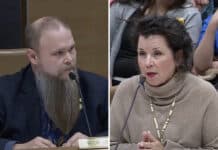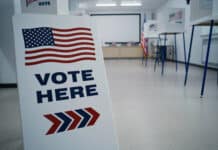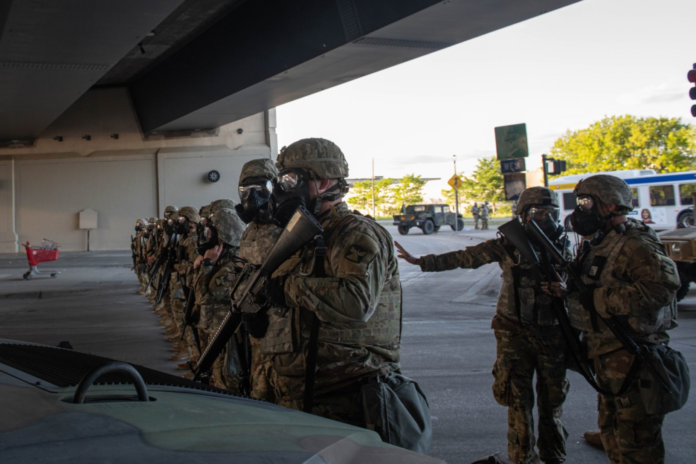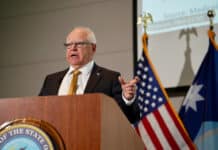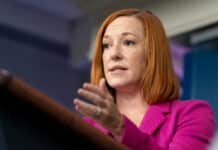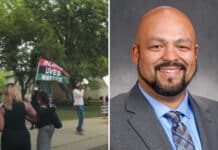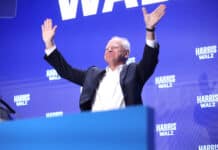A written testimony provided to the Senate Public Safety Committee in August and released last week shows Minneapolis officials sent Gov. Tim Walz an early and detailed request for the National Guard during May’s George Floyd riots.
The first batch of guardsmen didn’t arrive on the ground in Minneapolis until around 10:00 p.m. on Thursday, May 28, more than 24 hours after Minneapolis Police Department (MPD) Commander Scott Gerlicher completed a request for support from the National Guard.
Senate Republicans believe Gerlicher’s testimony “directly contradicts” Walz’s claim that he didn’t receive a specific request from Minneapolis early on in the riots, as he told reporters last month.
Gerlicher’s testimony states that he sent the request to Minneapolis Police Chief Medaria Arradondo at 8:13 p.m. on Wednesday, May 27. Arradondo then forwarded the request to Department of Public Safety Commissioner John Harrington at 9:11 p.m.
“By early Wednesday evening May 27, Chief Arradondo recognized that the situation in the city was dire and beyond the capabilities of our department and other law enforcement agencies who had been assisting us. The chief indicated that he contacted the Mayor about requesting the Minnesota National Guard Wednesday evening. It is my understanding that also on Wednesday evening, the request for the National Guard was made from the Mayor of Minneapolis to Minnesota Governor Walz,” Gerlicher said in his testimony.
He continued:
At 1945 hours Wednesday evening, I was asked by MPD Deputy Chief Henry Halvorson to complete a document with a written request for National Guard resources for the Chief of Police. Having drafted a previous request for the National Guard prior to Super Bowl LII, I was very familiar with what an initial request for the Guard should include. Typically, an initial request for the National Guard includes basic information in order for the Governor to make a decision. Once approved, this is then typically followed with more extensive and detailed information in close communication with the Minnesota DPS and National Guard command staff.
At 2013 hours that evening I sent a document titled ‘MN National Guard Request’ to Deputy Chief Halvorson and Chief Arradondo. The written request was detailed and specific and included a mission plan, command and control, and specific number of National Guard soldiers requested (600 at that time). It also stated that, ‘The MPD has expended all available resources within our department as well as all available law enforcement assistance from our neighboring jurisdictions.’
At 2111 hours, Chief Arradondo forwarded this same document with the request for National Guard assistance via email to DPS Commissioner Harrington.
Gerlicher said he continued to forward “additional specific and more detailed written requests for assistance.”
State Sen. Scott Newman, R-Hutchinson, said Gerlicher’s “stunning testimony” confirms that “Walz was not being truthful with the public about Minneapolis’ request for assistance during the May riots.”
“Commander Gerlicher paints a grim portrait of a department stretched impossibly thin while struggling to regain control of a besieged city without the support and backup from the state’s Commander in Chief. His testimony makes it crystal clear the lawlessness that took place at the end of May would have unfolded much differently had MPD received the support they asked for,” added Newman.
Gerlicher also revealed in his testimony that the Minneapolis Police Department had a plan to defend the Third Precinct, but was ordered to stand down by Mayor Jacob Frey.
“There was never a pre-plan by MPD to surrender the Third Precinct to protesters. In fact, to the contrary, we had a plan to defend the precinct indefinitely. By Thursday evening May 28, officers who were assigned to the precinct had endured unprecedented levels of violence towards them and had understandably become ‘battle weary.’ Our plan was to remove these Third Precinct officers from the precinct itself (40 or more) and replace them with a smaller highly trained SWAT strike team of approximately 12 officers,” he said.
“The plan was for this smaller SWAT team to remain out of site and inside the precinct and defend the precinct against protesters who may attempt to gain entry to the building. This would be accomplished by using both chemical munitions and less lethal projectiles. We had sufficient quantities of both on hand to defend the building for an extended period of time,” the testimony continued.
Gerlicher said it was only after Chief Arradondo ordered officers “not to use any additional chemical munitions or less lethal projectiles to protect the building” that they were forced to evacuate.
“It is well documented that this directive came from the Mayor through the Chief of Police,” he said.
His testimony also confirms that many critical 911 calls were left unanswered for an extended period of time because of a lack of resources.
“Commander Gerlicher’s testimony shows that Gov. Walz’s response to Minneapolis was woefully inadequate and delayed to the point that it allowed chaos to engulf the city,” Sen. Jeff Howe, R-Rockville, said in a statement.
“Furthermore, Commander Gerlicher’s testimony reveals how Gov. Walz has been misleading Minnesotans about the order of events to deliberately dodge taking responsibility for his failures in the chain of command,” he added. “Unfortunately, these failures resulted in a delayed deployment of the Guard, which allowed lawlessness to besiege the city that would ultimately destroy lives and neighborhoods throughout the city. The fault of this, at least in part, lies with this administration.”


